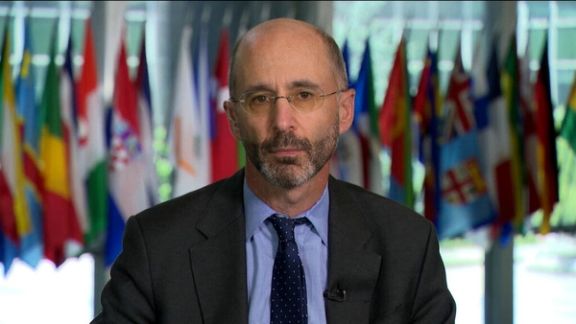Malley was placed on unpaid leave and had his security clearance suspended in April 2023. Iran International first reported the incident in June, but the State Department has since blocked all efforts to gather further information on Malley’s case.
Two influential congressmen suggested in May that Malley lost his security clearance because he had transferred classified documents to his personal email and cell phone, and the documents were then stolen by a hostile cyber actor.
Now, a new report by the Wall Street Journal says “Malley had clicked on a phishing link, which compromised a personal email account.”
Citing people familiar with the matter, the report said investigators also discovered evidence that “Malley had potentially moved classified material, including meeting notes, to a personal account.”
The probe into Malley’s conduct resulted in a “tense meeting between senior Federal Bureau of Investigation and State Department officials,” WSJ reported. “The FBI viewed his work as sloppy, and the implications serious, while the State Department officials defended him.”
The State Department believed that the allegations against Malley “didn’t reflect serious misconduct,” a senior State Department official told the department’s inspector general, according to WSJ.
However, the State Department itself is accused of violating regulations by not reporting allegations against Malley to the department's watchdog, an internal probe obtained by Iran International revealed earlier this week.
The state department has yet to release details of these allegations which led to the revocation of Malley's security clearance, and effectively ended his mandate.
The report, initiated by the State Department's Inspector General months ago, highlights procedural lapses that likely allowed Malley to engage in activities beyond his authorized scope of work even after the suspension of his role.
Key issues highlighted in the report are the delay in notifying Malley of his clearance suspension and the department’s failure to inform other staff that Malley was no longer permitted to access classified materials.
‘Malley showed his hand too soon’
Appointed by President Biden in early 2021, Malley was tasked with leading the administration’s efforts to revive the 2015 nuclear deal with Iran which had been abandoned by Donald Trump in 2018.
In the course of talks with Tehran on the revival of the JCPOA, Malley proposed removing the toughest portion of the US sanctions that related to Iran’s nuclear program. However, his direct approach “worried some members of his 10-person negotiating team, who believed he was showing his hand too soon,” the WSJ report said Sunday.
“The basic criticism was about how much he unveiled,” said Enrique Mora, the EU’s deputy foreign policy chief and top negotiator at the time.
When hardliner Ebrahim Raisi was elected as Iran’s new president in 2021, nuclear talks broke off without a deal. Later in November that year, the Iranian negotiators led by Ali Bagheri-Kani met with US counterparts saying they wanted to restart the negotiations from scratch. At the time, the WSJ said, “Malley advocated for staying, believing that the price for persuading Tehran to return to talks later would prove too costly.”
However, Malley’s decision to stay fractured the US negotiating team, resulting in the resignations of Malley’s deputy, Richard Nephew, and other team member Ariane Tabatabai.
“The US showed that it was quite desperate to get a deal,” the WSJ said citing a European negotiator. “The Iranians knew they could just string it out.”







